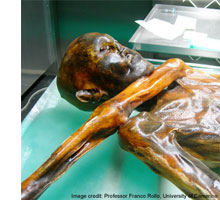
Ancient mystery of the day: does Ötzi, a 5300-year-old human mummy found frozen in the European Alps in 1991, have any living descendants today?
Ötzi was fully defrosted in 2000, and since then, Franco Rollo of the University of Camerino, Italy, and his colleagues have been gleaning what they can from the mummy's DNA.
In 2002 we found out from DNA extracted from the contents of his gut that before Ötzi died he feasted on ibex goat and vegetables, followed by red deer and possibly some grains. This carnivorous diet, along with an arrow head found in his shoulder, suggested that he was a hunter, killed by a hungry rival. DNA from pollen on Ötzi's clothes also showed that his last walk was through a coniferous wood.
Today, Rollo has published a paper in the journal Current Biology, in which he reports the full sequence of the DNA from Ötzi's mitochondria. These are tiny organelles inside cells which produce energy, and they have a few genes of their own. Mitochondria are only inherited through the maternal line, and their DNA is good for tracking ancestry over very long periods of time.
Rollo's team reports that Ötzi belonged to a lineage for which no survivors are known today, suggesting that his line probably went extinct.
But within hours of the announcement, a rival team said they had found the opposite. Alan Cooper, head of the University of Adelaide's Australian Centre for Ancient DNA and his colleagues have been working on their own analysis of the mummy's mitochondrial DNA, and have apparently found someone living today who is "very, very closely related" to Ötzi. They have submitted a paper for publication in a journal, so I guess we'll have to wait till it comes out to see the full details.